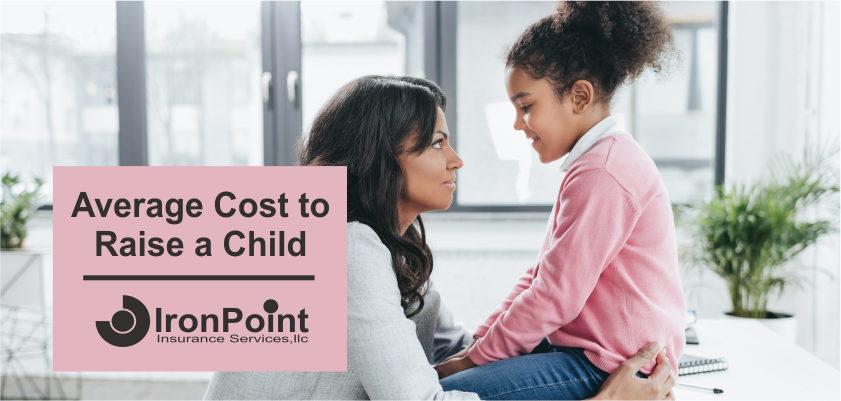What is the Averge Cost to Raise a Child?

When you consider having children and starting your family, you’ll likely think about many things, most obvious among those would be timing, your monthly budget and concerns over the newborn’s health. What you may not think about is the average cost of raising a child from birth to year 18.
Regardless if you’re already expecting or merely in the planning stage, knowing the full cost of bringing a child into this world is just good information. The total cost to raise a child is a big price tag, and it deserves to be understood be aspiring parents. Let’s breakdown the full costs from pregnancy through college, and maybe beyond.
What does it cost of have a baby?
According to Business Insider, the average cost to deliver a baby in a U.S. hospital is $10,808. But you can expect to pay more or less depending on a few factors. Let’s take a look:
- The type of delivery you elect. C-sections have become 500% more common over time, and are far more expensive than natural deliveries. Therefore, if you’re intent to have a C-section you can expect to pay much more for your child’s delivery.
- Do you have health insurance? It makes sense, if you’re insured your out-of-pocket expenses will be much lower. Typically, the insured costs will be determined by coinsurance, co-pays or deductible provisions of the health insurance policy purchased. For the uninsured, you will likely have to bear all the expenses out-of-pocket, and this can make a significant difference in costs.
- Where you live. We all know that things have different prices from state-to-state, and this is true for childbirth too. For example, a natural birth with insurance in Alabama costs about $5,230, but that same procedure in New York is $8,463. That’s an difference of about 50%. For the more expensive C-section procedure, the without insurance the cost difference can be even larger. A C-section is $13,590 in Alabama compared with nearly $29,000 in Alaska—that’s more than double the cost.
- Preparation and amount of care. It’s important to note, the costs for a delivery in the hospital don’t cover complications or any ancillary care you may require. The hospital costs also don’t factor in the basic costs for prenatal care. Prenatal care will also vary on the type of insurance coverage and plan and is extremely important for a healthy pregnancy.
How much will my baby’s stuff cost?
Babies need a lot of stuff, that’s just a reality. In fact, you’ll need a lot of stuff to help properly care for and raise you child. So, beyond the medical costs for the delivery, prenatal care, and any extra care required, you’ll need to consider all the following:
- Transportation gear like an infant car seat, which is often required by your state’s laws. You’ll also need a safe and dependable stroller, baby carrier, and diaper bag. Costs for these items can range from $150 to $1,000+ each based on preferences, quality, and options.
- A baby bed. Your baby’s crib can vary quite a bit, and many are very expensive. Depending on how fancy you go, a crib could set you back anywhere from $180 to $3,000+, but don’t always go to the cheapest model. Make sure you do your research because safety should be a greater concern when buying a baby crib.
- Clothes, diapers, nursing or feeding equipment, and other miscellaneous items.
Now, how much to raise that child?
When you have a child, you will be committed to raising that child through 18-years, and maybe beyond. While childbirth is a huge event, and has significant costs, it’s only a small portion of the overall costs to raise a child.
The United States Department of Agriculture has put together the average cost to raise a child in the United States. Here is a breakdown, it will cost you approximately $1,081 per month, that’s $12,978 over a full year and $233,610 from childbirth to 18-years.
When you put the costs into perspective, it can give you a little sticker shock. This means you need to plan out your budget wisely before you dive into parenthood. While you can’t eliminate all risk when having a child, being fiscally prepared can at least moderate the financial concerns and make parenting a bit easier.
While you plan to have your new bundle of joy, you should consider budgeting for these items:
- Housing and transportation. This is one of those items that will differ depending on where you live. If you live in the city, the transportation and increased housing costs can be as much as $3,900 per year, while parents who live in rural areas may expect to pay an incremental $2,400 per year. According to the USDA study the incremental increase in housing and transportation can be as much as 15% of child-raising costs. The reality is that you have to make baby safe when they travel.
- Food costs. Food costs will certainly go up as your child gets older (and bigger), but it starts with a choice. Will you be nursing or formula feeding? This is important because the choice comes with a significant price difference in baby’s first year. Formula can cost anywhere from $900 to $3,000 a year. This may make nursing, which is free, more attractive until you consider the price of items like pumps and bottles, which can quickly add up.
- Diaper costs. Newborn Babies go through a whopping 2,700 diapers in their first year, you’ll need to be prepared for this reality. If plan to use disposable diapers, you can expect to pay about $550 during the first year. This may make cloth diapers an interesting alternative with it’s upfront investment (around $250), but it too has it drawbacks. First, you’ll need to clean all those diapers yourself. And don’t forget the mess.
- Clothing. This expense will ultimately add up to significant percent of your total child raising expense. It starts relatively cheap with an average cost for baby clothes at about $60 per month, however, over the years, the costs go up. Just think of all those toddler shoes! Toddler shoes alone will add up to about 6% of your total child-raising cost. It’s just lot of shoes.
- Childcare. An estimated 16% of your “raising the kid” fund will go toward childcare and education, according to the USDA. Daycare and nannies can be a big expense if you and your partner have to work. You may also want to factor parental leave, especially if you’re self-employed or your employer doesn’t cover it.
Plan for your child’s future
The USDA study concludes at year 18, so it doesn’t consider the costs of a college education. But this is an important investment in your child. If you plan on helping your kid through college, you can expect to pay an average of $20,090 a year for a public university and $45,370 for a private one, including room and board. Of course, you may be able to get some assistance, and talented children may even earn scholarships. However, for must of us, to help cover these costs we’ll need to consider setting aside additional funds through a 529 college savings plan.
Does the cost of raising a child differ based on where you live?
Yes. Where you live is extremely important in determining the costs. The Urban Midwest has the lowest estimate of $227,400, while the Urban Northeast has the highest at $264,090. If you live in a rural area, the cost drops even more to $193,020.
Protecting your family for life
Parenting can be hugely rewarding, but it isn’t cheap. As you plan for the future, and develop your financial plan, consider how home and auto insurance are the foundation to secure these plans.
You should also consider life insurance, it doesn’t only provide financial protection, but it can reward you with peace of mind as well. If you are offered life insurance though your employer, you should still consider another policy as you can often get better benefits that are more portable. Remember, nothing is more important than taking care of the ones you love, and you’re already off to a great start.

Compare Quotes Online
Want to know if you can save on home or auto insurance? See for yourself. Start a quote today.
Give us a Ring
1-877-334-7646
Call today and speak with a professional insurance agent.